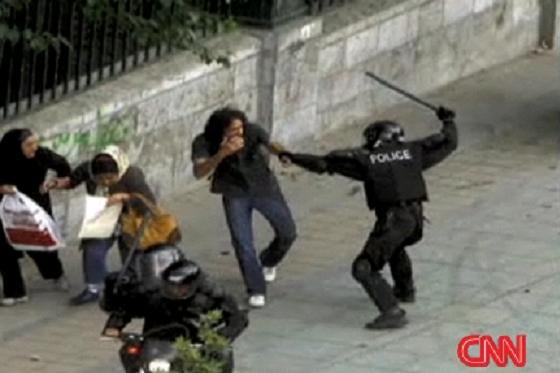
Dozens of journalists have been arrested in Iran since 12 June and are at risk of being tortured, according to Amnesty International.
The charity today adopted all of the detained journalists as ‘prisoners of conscience’.
Since President Ahmadinejad was announced as the winner of the Iranian presidential election severe curbs have been placed on freedom of expression in the country. Access to the internet has been blocked or interrupted, Iranian publications have been banned from publishing information about demonstrations and foreign journalists have been banned from the streets and in some cases expelled from the country.
According to Amnesty, up to 25 employees of the newspaper Kalame Sabz were arrested on 22 June and their whereabouts are still unknown. The newspaper was established by presidential candidate Mir Hossein Mousavi and has not been published since 14 June.
Foreign journalists have also been arrested in Iran such as Newsweek’s Maziar Bahari, who has dual Canadian and Iranian nationality and and Iason Athanasiadis-Fowden, who has duel British and Greek nationality.
Deputy director of Amnesty in the Middle East Hassiba Hadj Sahraoui said: “If nothing else, the authorities must immediately disclose the whereabouts of these journalists, ensure that they are not tortured or otherwise ill-treated and allow their families and lawyers access to them.
“Unless the authorities lift all unlawful restrictions on freedom of expression – which includes the right of journalists to report on events – and release all the journalists arrested, we can only assume they are trying to hide evidence of abuse and further silence any critical voice.”
According to Amnesty, hundreds of politicians, journalists, academics, students and human rights activists have been detained, some only briefly, across Iran since the election.
At this year’s British Press Awards – the prize for international journalist of the year went to an Iranian for the second year running.
Mohammad Sadegh Kaboudvandd was the editor of a weekly newspaper and is currently in prison.
Upon winning the award in March, he said in a statement: “In our land, no one is free to express their true beliefs, but rather one is forced to think and reflect along the lines off what the state has ‘ordained’ for us.
“Individual thoughts and expressions are allowed only when they coincide with the official viewpoints.”
According to Amnesty, the following journalists are among those detained in the last fornight:
- Mahsa Amrabad, a journalist for the Etemad-e Melli newspaper founded by presidential candidate Mehdi Karroubi, who was arrested from her home on 14 June
- Abdolreza Tajik, editor of the weekly magazine Farhikhtegan, who was arrested from the magazine’s offices on 14 June.
- Keyvan Samimi Behbehani, editor of the banned Nameh magazine, who was also arrested at home on 14 June. He is also a member of the Centre for Human Rights Defenders’ Arbitrary Arrests Committee.
- Mojtaba Pourmohsen, editor of the newspaper Gilan-e Emrooz, from the northern city of Rasht from where he hosted a programme for the Netherlands-based Radio Zamaneh, who was arrested on 15 June.
- Fariborz Soroush, a freelance journalist who has given interviews to the Prague-based Radio Farda, who was reported to have been arrested on 16 June.
- Saeed Laylaz, a prominent economic journalist who writes for Sarmayeh and who had been very critical of incumbent President Ahmadinejad’s economic policies was arrested on 17 June.
- Mohammad Ghochani, the editor of Etemad-e Melli was arrested on 18 June at his home. According to information received by Amnesty International, he is believed to be held in Section 209 of Evin Prison in Tehran, which is controlled by the Ministry of Intelligence.
- Karim Arghandehpour, a freelance journalist and blogger who used to write for various now-banned reformist newspapers, who was arrested on 14 June.
Email pged@pressgazette.co.uk to point out mistakes, provide story tips or send in a letter for publication on our "Letters Page" blog
